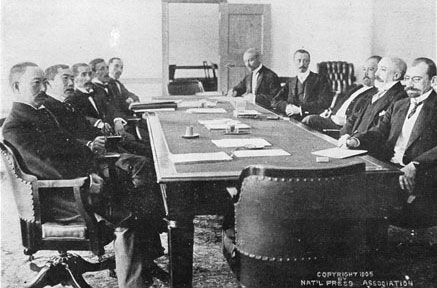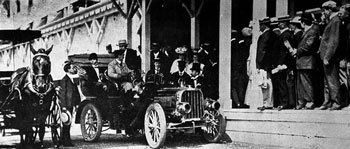
The envoys met every morning in the conference hall of the navy yard and after a simple greeting set to work. Witte and Komura were invariably the negotiators, the two ambassadors, Rosen and Takahira, sinking for the time being into persons of secondary importance. Komura and Witte were, therefore, the heroes of the drama. -- E. J. Dillon, "Sergius Witte and Jutaro Komura," Harper's Weekly.
August 9, Wednesday: Negotiations Begin
The parties met in formal session for the first time in the naval stores building at the Navy Yard on Wednesday, August 9. Only the two chief plenipotentiaries for each side attended the meeting, which was held primarily to exchange credentials. They decided to meet daily at 9:30 a.m. and 3 p.m. with each meeting scheduled to last about three hours. The Japanese insisted that only the chief envoys, their secretaries, and interpreters would attend the sessions and that other delegates would be called only when special points were to be discussed.
It was also agreed that the Russians would use French and the Japanese English for discussions with the final treaty to be written in both languages, however, the French version would be used to settle differences in interpretation. On a more serious question, the Russians wanted open discussions in the belief that the expected harsh Japanese demands would gain sympathy for Russia if publicized. The Japanese again demanded secrecy and won their point. Witte, however, often discussed or leaked aspects of the negotiations to newsmen.

The two delegations met across a seventeen-foot long table in the General Stores building at the Portsmouth Naval Shipyard. Portsmouth Athenaeum collection.

Members of the press and local people made up the Wentworth crowd as the Japanese boarded an auto for the ride to the shipyard. Portsmouth Athenaeum collection. View larger image.
As the negotiations progressed, the parties often issued a joint news release but it rarely provided much information of subsistence. With little other news to report, the local Portsmouth Herald was particularly interested in the public approach taken by the Russians and Japanese. On the evening when the delegations arrived, the Herald commented, “The envoys are evidently imbued with the democratic spirit of America. On Tuesday evening, they mingled with the guests at the Wentworth apparently unconscious of the fact that the eyes of all observers were upon them. The Japanese strolled up and down the verandas and the Russians passed some time in the ladies' billiard parlor."

Members of the press gathered on the Wentworth porch. Portsmouth Athenaeum collection. View larger image.

Harper's Weekly. View larger image.
Of the more than one hundred special journalists on hand for the conference, William Dean Howells, who summered at Kittery Point, was the dean. He described the numerous "summer girls" who were very much in evidence at the hotel. "It is said," he wrote, "that those young ladies leave the peace commissioners with very little peace, and that what with the heat, and what with the mosquitoes of the past week -- But why repeat the idle gossip of which the daily press has already been too full? It is not credible that the summer girls will seriously retard the negotiations at the Kittery [sic] Navy yard and there is no reason why they should not amuse the leisure of the commissioners at the hotel; and if these carry away with them to their distant homes a rather bewildering ideal of American girlhood, it will not be the fault of the American girl, because she is never at fault."
